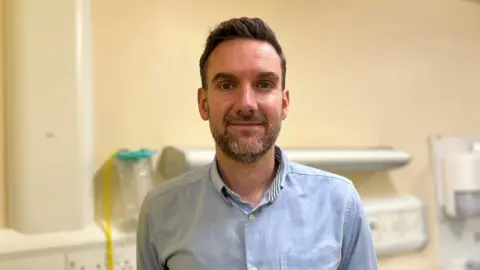 Sandwell and West Birmingham NHS Foundation Trust
Sandwell and West Birmingham NHS Foundation TrustThe state of end-of-life care needs needs to be "addressed" before legalizing assisted dying can be considered, a palliative care expert has said.
Lawmakers across the country will vote on Friday whether to advance the proposed bill to the next stage.
However, Dr Mike Blaber, palliative care consultant at Sandwell and West Birmingham NHS Trust, said end-of-life care needed "urgent attention".
Hospices have warned the sector is facing a financial crisis despite pledges of government support.
"(The bill) is not a case of expanding options because the options to provide quality palliative care currently don't exist and that needs to be addressed before we can do anything else," Dr. Blaber said.
A branch of medicine dedicated to relieving pain and improving quality of life for terminally ill patients, the best example of which is can have a huge impact experiences for them and their families.
 St Giles Hospice
St Giles HospiceDr Blaber opposes legalizing assisted dying and said vulnerable patients without access to quality palliative care may feel pressure to end their lives if a new law is passed.
He said he had encountered patients who did not want to be a "nuisance" and was concerned the legislation would add "subtle pressure" to those who feel palliative care is no longer an option.
He told BBC radio WM that the industry was "grossly underfunded".
St Giles Hospice in Lichfield warned in the summer that it was facing a £1.5m deficit.
Its chief executive Elinor Eustace said sustainable funding was "a must" to meet the needs of everyone who needs end-of-life care.
She added that the parliamentary bill comes at a time when hospices are facing "increasingly challenging times".
Birmingham Hospice also announced in June that it would close beds and cut staff due to an estimated budget shortfall of £2.4m, despite huge demand for its services.
Paul Bytheway, the hospice's chief executive, said the debate around the bill highlighted the need for "significant, sustained increases in funding".
"We know most people don't want to die in hospital. Hospices are ready and able to help, but we can't cover the costs through charity fundraising alone."
He called for a long-term funding proposal to be developed to support growing demand for the service.
'More investment is needed'
many others National Hospice in a similar position.
Hospices UK, which represents the industry, has requested £110m in emergency funding.
"Quality hospice and palliative care is not currently available to all people who need it," the report said, adding that demand continues to grow.
The group called on MPs to support "more investment".
Earlier this month, Health Secretary Wes Streeting told the BBC he would "make sure we protect our hospices" following concerns over increases in National Insurance (NI) employer contributions. Budget, It would have a negative impact on the hospice's finances and its ability to support people.
"Caring for terminally ill patients is not a burden, it's a privilege, and that's what we should be focusing on," Dr. Blaber said.
